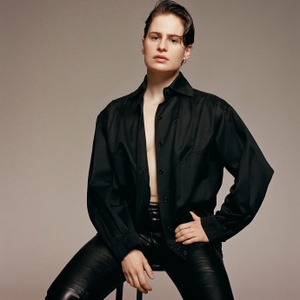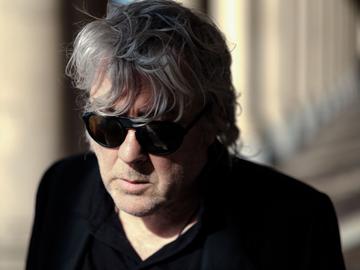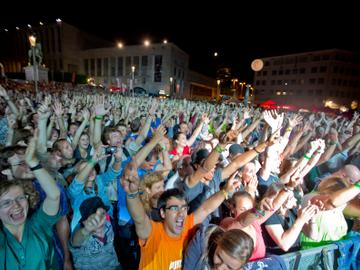At the Brussels Summer Festival, Héloïse Letissier aka Christine aka Chris will play with her Queens in front of the Royal Palace. After beating her demons and crowning herself a role model for 21st century kids who are lost between the sexes, she doesn’t believe in hiding anymore. “I want to reveal myself through my stage characters.”
A few days before we called the enthusiastic Héloïse Letissier (31), we saw her performance during the finale of RuPaul’s Drag Race, the season highlight of the popular American talent show for drag queens. “It was like coming full circle for me,” says the French singer whose debut album Chaleur Humaine was an instant and global hit five years ago.
Last autumn, its forceful follow-up Chris gave deeper insight into her wounds and how to transcend them. But apart from the music, it was the “inclusive, generous and inventive drag culture” that really kick-started her career and life. “I’ve been a fan of RuPaul’s show for a long time, so it was very emotional. Christine and the Queens were born out of the same idea of empowerment.”
Before you wrote the songs for your debut album, you met three drag queens in London. They took care of you after a bad break-up, but what exactly did they do to empower you?
Héloïse Letissier: They shifted my perception. Before, my flaws, imperfections, and insecurities were taking me down. They showed me how to turn them into something good and now I’m not afraid to let them define me anymore. Drag queens have to play a character onstage. But at the same time, it is a way for them to be most purely themselves and a way to overcome old pains. They sometimes name themselves after the insults that they used to get called. It goes deep, but the goal is to come out stronger than the trauma. That is the most empowering. Nowadays, I don’t believe in hiding anymore. I believe in revealing myself through my stage characters. Journalists sometimes ask me where Héloïse stops and Chris or Christine begins. They often don’t realize that being onstage is the sincerest way of being myself.
To you, the drag queens were the ultimate proof that people could exist outside society’s gender binary. Do you remember when you became aware of that system?
Letissier: Yes, at a very young age, but I found it most difficult in high school. I only met the drag queens when I was in my twenties, but when I was thirteen, I already felt trapped in a system that didn’t make sense to me. I was seeing young men playing the dude, and girls playing the girly girl, and I just couldn’t. Because there wasn’t anybody I could talk to about my questions, I started reading. Reading Judith Butler’s Gender Trouble when I was fifteen was a real eye-opener: “Oh, but gender is performance!” The older I got, the more I surrounded myself with people who did understand me, and now I am happy that this conversation is getting bigger and bigger because along the way, I have seen many kindred spirits stuck in constricting “boys don’t cry” and “girls have to behave” straitjackets.
What were your coping mechanisms?
Letissier: I retreated into literature and art. High school is incredibly punishing anyway. You don’t really understand how everything works. You are expected to adopt an identity. But everything is so fragile. I was bullied a little bit, but it was okay. I was a very good student and a theatre kid. I spent a lot of time daydreaming, but I was also a prankster. I played the clown and that saved me. Humour was my most important survival technique, my way of being allowed to be different.
You have more self-confidence, but in the dark song “What’s-Her-Face”, one of the tracks on Chris, you admit that you can never completely shake off that young, insecure girl.
Letissier: It was a difficult song to write because I was going through all those emotions again at the time. If someone was giving me side eye, it reawakened that girl and I felt awful and I was like: no matter how empowered I become, I carry that with me. It is one of the scars that is simply part of my history. In a certain sense it is also beautiful because it makes you human. That is why success is sometimes so ambiguous. Once you have “made it”, people start projecting infinite happiness onto you. They think that now suddenly you are completely fine and they flatten out your history.
You describe your metamorphosis from Christine to Chris as a small mutation of the same character. What exactly do you mean by that?
Letissier: While I was writing my second album, it became clear to me that I couldn’t simply continue as Christine and the Queens. I wanted to find a way to alter it because I was not in the same place anymore, and I wanted to express a sense of freedom. It was actually very difficult. A marketing dude would say: you are endangering your own brand. But I don’t care. I’m not a brand. Chris had already become my nickname anyway. And what’s more, the new songs were defiant, frontal, and raw, and they suited my nickname better. I also thought it was a very witty thing to do. You can never completely lose a name because it becomes part – yet again – of your past, but you can have fun with it. To me, a music career is like reading a novel. Each album is a different chapter and each chapter has a different mood.
Is it true that The Marshall Mathers LP by Eminem was an inspiration? That was the album on which the popular American rapper deconstructed his own Slim Shady character.
Letissier: I wish I was as dangerous as Slim Shady, but of course I am not. I was inspired by his concept. Primarily because I liked the idea of making something that comes out of your subconscious. But that album was also released after he had already had his big break. On the interludes between the songs, you can hear Eminem’s label bosses shouting “You fucked it up! You’re not going to be as successful.” That was quite relatable for me at that point. You can really see the human behind the machine.
When I was a teenager and I saw David Bowie sing ‘Life on Mars?’ on TV, I thought: ‘That could be me’

You recorded the album in French and in English. That idea could have come from the marketing manager of a record label.
Letissier: You should know by now that nobody is doing my marketing. (Laughs) My case is really weird, because I’m a French artist, who did a huge first album, and then exported it. But my second album was going to be released everywhere at the same time. In the end it was actually my own idea to record the album in two languages. There aren’t many precursors, except Céline Dion. (Laughs) But she doesn’t write her own songs. That is easier. The advantage is that when I sing live, I can become like a shuffle: when I’m at home I play more French-speaking songs and when I perform in the English-speaking world, I sing more English songs. It certainly wasn’t a bad thing for my airplay in the UK, but I mainly did it because I like to be understood. It also fits well with the album, which is about excess.
Most people don’t like turning thirty, but it seemed like a relief to you.
Letissier: That’s because I hated my twenties so much! I didn’t feel comfortable in my own skin, but now I am far more at ease with who I am. I am even looking forward to getting older in an industry that has a reputation for side-lining older women. I promise to spend much more time in front of the cameras when I get wrinkly. (Laughs) It’s lucky I’m not an actress because women have a much harder time of it in the film world. The pressure to stay eternally young is deadly, but then when actresses do keep looking young, everyone screams: “They’re using Botox!” There’s no way to escape that shit. But that’s really just to say that I am already looking forward to being a wrinkly old rock star.
That intransigence is due to an old trauma that you suffered at drama school. Were you told literally that you couldn’t be a director because you are a woman?
Letissier: No, it was much more subtle than that. I noticed it, for example, in the special treatment that my male colleagues would receive when they were producing a piece. Cool, I thought. I would like that too, but I was not allowed because my piece was supposedly not good enough. That was the only feedback I would get, while I watched male colleagues perform terrible interpretations of Baudelaire. It was shamelessly sexist. But it was never said explicitly. Eventually I was expelled because I wanted to pursue a career anyway. A petition by my fellow students fell on deaf ears. But it is true that this traumatic experience is a big part of the reason why I was doubly self-confident when I made my foray into the music industry. Everybody had to accept that I would write my own songs and produce my own record. Some people in France might call me bitchy because of that, but I just know what I want, which is a different thing, I guess. (Laughs)
People in France only seemed to realize what your songs are about when you cut your hair short.
Letissier: Yes, while I wanted to show a certain ambivalence by playing with different facets of femininity, some people only noticed that my hair was suddenly short. “Now she’s a man!” they said. It was interesting and depressing at the same time because how much narrower can you possibly make the definition of “being a woman”? The stereotypes surprised me, but I try to deflect and inflect that. I take the greatest pleasure in messing things up a bit. And I also find it quite funny that that is so easy to do. People will always get into a cold sweat because they don’t understand, but they can never hold me back. It is crucial to keep on offering options that can be a hint of something more. When I was a teenager and I saw David Bowie sing “Life on Mars?” on TV, I thought: “That could be me.”
You now sing his song “Heroes” live. “From Héloïse to heroine” was once one of our headlines.
Letissier: Oh, how flattering. I don’t know if I’m a real one yet, but I hope to be. The lyrics of “Heroes” continue to be as relevant and as powerful as ever.
CHRISTINE AND THE QUEENS 14/8, Paleizenplein
BRUSSELS SUMMER FESTIVAL 14 > 18/8, various locations
Read more about: Brussel-Stad, Muziek, Brussels Summer Festival, Christine And The Queens




Fijn dat je wil reageren. Wie reageert, gaat akkoord met onze huisregels. Hoe reageren via Disqus? Een woordje uitleg.